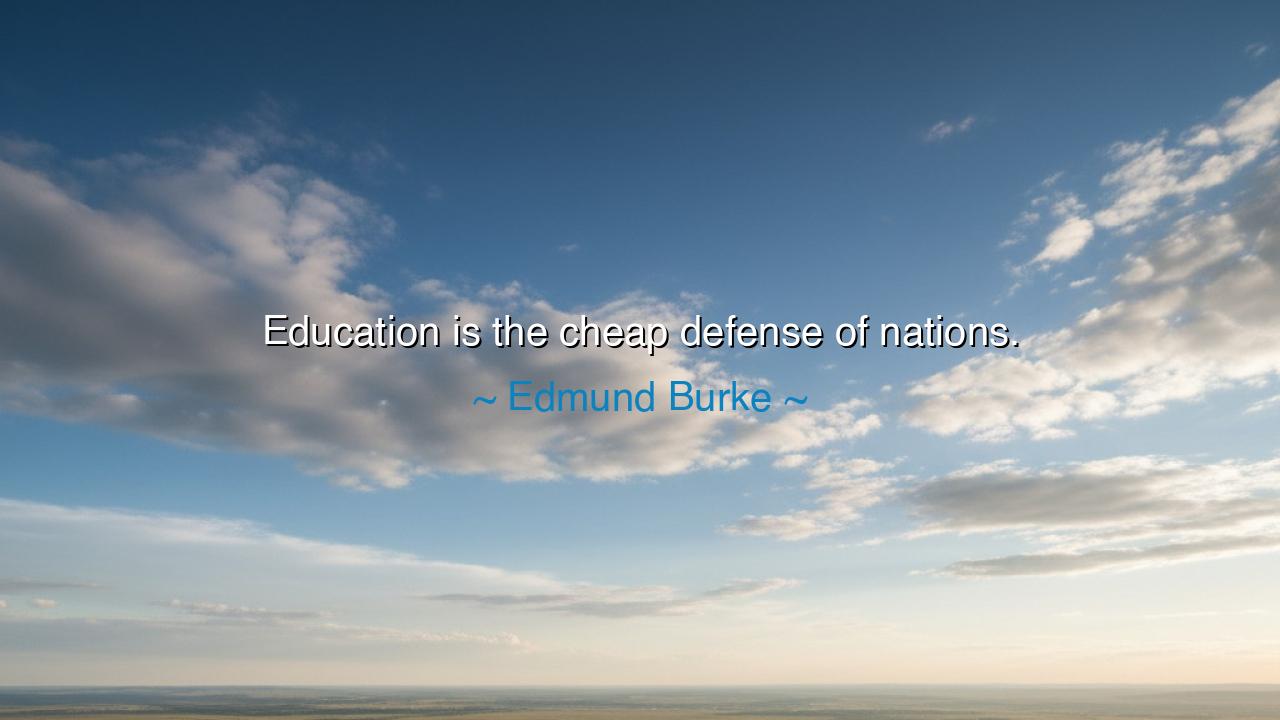
Education is the cheap defense of nations.






Hear the solemn words of Edmund Burke, a voice of wisdom in an age of upheaval: “Education is the cheap defense of nations.” Do not take this saying lightly, for in it lies the secret to both the survival and flourishing of peoples. Armies may be raised, fortresses built, weapons forged, yet all these defenses crumble when ignorance reigns. But when a people are educated, their minds sharpened, their hearts lifted, and their judgment refined, they stand as a fortress far stronger than stone walls or iron shields. For true defense is not merely of borders, but of the spirit of a nation.
When Burke calls education the cheap defense, he does not belittle its value. Rather, he exalts it as the most cost-effective, enduring safeguard a society can possess. The raising of armies drains treasuries, wars consume generations, but the investment of knowledge multiplies endlessly, strengthening citizens to resist tyranny, deceit, and decay. An educated people cannot be easily enslaved, for they discern lies, demand justice, and uphold liberty with conviction. Thus, where ignorance breeds vulnerability, education cultivates resilience.
The ancients themselves bore witness to this truth. Consider the city of Athens, whose warriors fought bravely at Marathon and Salamis, but whose greatest defense lay in the education of its citizens in philosophy, rhetoric, and the arts. Their pursuit of wisdom birthed democracy itself, giving them strength not only in battle but in governance, trade, and culture. In contrast, Sparta, though fierce in arms, built its foundation almost solely on war, neglecting the broad education of its people. In time, it was Athens, with her thinkers and her teachers, who left the greater legacy. Knowledge, not merely weapons, was the true shield of her greatness.
History in more recent times proves Burke’s words anew. In the years after World War II, Japan lay devastated, its cities in ruins, its armies disbanded. Yet rather than rebuild itself on arms alone, Japan turned to education, reforming its schools, cultivating literacy, science, and technology. In a few decades, this small nation rose again, not by conquest, but by knowledge, becoming one of the strongest economies in the world. Here was education as the cheap defense—not through violence, but through wisdom, innovation, and discipline.
The meaning of Burke’s words, then, is profound: that the true strength of a nation rests not in the might of its armies but in the enlightenment of its people. A cannon may guard a city for a season, but an educated generation guards it for centuries. Knowledge equips a people to resist tyranny from without and corruption from within. Education makes citizens, not just subjects; thinkers, not just followers; leaders, not just survivors. It is the defense that multiplies itself, passing from teacher to student, from parent to child, a living shield handed down through the ages.
The lesson is clear. If we would see our nations safe and prosperous, let us invest not first in weapons, but in schools; not in war, but in wisdom. Let every family honor learning as a sacred trust, and every society treat teachers as guardians of the common good. To neglect education is to disarm the future; to cultivate it is to defend it more surely than by any sword. For the battlefield may be won by soldiers, but the soul of a nation is secured by the educated.
Practical action must follow. Seek knowledge not only for yourself, but for your children, your neighbors, your community. Support institutions that teach truth, justice, and wisdom. Guard against ignorance as fiercely as you would against invasion. Read, study, question, and share what you know. In so doing, you become part of the living defense Burke spoke of—a shield of wisdom around your nation, stronger than any wall, cheaper than any army, and more enduring than any weapon.
Thus, let this teaching be passed down: education is the defense of nations, and the cheapest, because its cost is but a fraction of the price of war, while its reward is peace, prosperity, and freedom. Cherish it, pursue it, defend it, and you will secure not only your own future, but the future of your people for generations yet to come.






AAdministratorAdministrator
Welcome, honored guests. Please leave a comment, we will respond soon